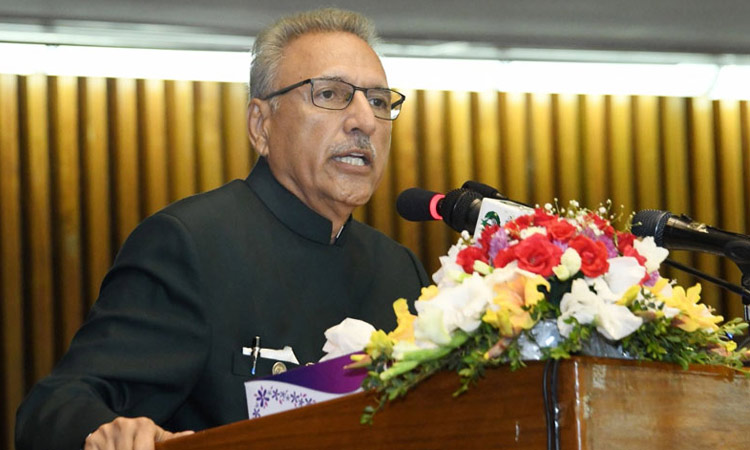Pakistan president ratifies social media law; tough penalties for spreading ‘fake news’





President Arif Alvi addresses the joint session of parliament in Islamabad. File
President Dr Arif Alvi on Sunday promulgated an ordinance to amend the Prevention of Electronic Crimes Act (Peca) with Law Minister Barrister Farogh warning that no one would be exempt from indulging in fake news.
An amendment has been made in Section 20 of Peca, increasing the jail term for defaming any person or institution from three years to five years. The offence has been made non-bailable and the concerned court has been asked to decide such cases within six months.
The ordinance was widely denounced by the premier journalists’ body, the Pakistan Union of Journalists, and political leaders. They said the government has introduced the law to curb media freedom and punish its rivals.
The ordinance was promulgated a day after the federal cabinet gave approval to the amendments in the Peca, 2016.
According to the ordinance, a complainant has been defined as the aggrieved person, his authorised representative, his guardian in case he is a minor or "a member of the public in respect of a public figure or a holder of public office." Online public defamation has also been made a cognisable and a non-bailable offence.
The definition of a "person" has been expanded to include any company, association or body of persons whether incorporated or not, institution, organisation, authority or any other body established by the government under any law or otherwise.
The ordinance also stipulated the insertion of a new section in the act under which a timeline was given for the court to wrap up the case. "The trial shall be concluded expeditiously, but preferably not later than six months of taking cognizance of the case."
The ordinance also stated that the court would have to submit a monthly progress report of any pending trial to the high court concerned and give reasons for the inability of the court to expeditiously conclude the trial.
"In case the high court finds the reasons given by the court under sub-section (2) to be plausible ... it may accept the explanation of the court, and prescribe fresh timelines for the conclusion of a trial."
On the other hand, if the high court acknowledged "difficulties, hindrances, and obstacles for concluding a trial expeditiously, which are removable by the federal or provincial government or any of its officers [...] it shall call upon the federal or provincial government or any of its officers to remove such obstacles."
It stated that where the Ministry of Law and Justice secretary of the provincial secretaries of the same ministry were of the opinion that the delay in the disposal of the trial was attributable to a presiding officer or any of its functionaries, "it shall furnish such information to the high court concerned, proposing suitable action."
It added that the high court could order disciplinary action against the presiding officer or any of the court's functionaries if they were found to be responsible for the delay in the disposal of the trial.
"The chief justice of every high court shall also nominate a judge along with other officers from the court for acting under this section," it concluded.
Naseem called for rooting out the propagation of "fake news" and said that no one will be exempt from indulging in the menace under the amended laws.
He told reporters that spreading fake news would be treated as a cognisable offence after the amendments to the act took effect. "It will also be a non-bailable offence with up to six months imprisonment."
Naseem said that the amended law would help curb fake news. "Whatever happened in the past is gone, now we are moving in the right direction."
The minister explained that the law was primarily for a public figure or a public office holder, while a complaint about disinformation or false news could be filed by the public at large.
Giving an example, he said: "Suppose, fake news is spread about a veteran film actor named Nadeem. It's not necessary that Nadeem himself should turn up to lodge a complaint. Instead, anyone can approach a relevant authority with a complaint and the case has to be wrapped up within six months under the law."
The minister quoted a few recent instances wherein some dignitaries were targeted with false information. He said it was regrettable that filthy language was used against former chief justice Gulzar Ahmed a few weeks ago.
"Similarly, wrong information about the first lady made rounds that she had a bust-up [with her husband] leading her to leave her home... how can one spread such incorrect stories?" the minister wondered.
Asked whether the ruling party was introducing the new law as it could feel the end of its tenure approaching and to prevent rivals from targeting the party, Naseem said that he did not believe that the government's days were numbered.
"In case we are in the opposition, then this law will obviously not be favourable for us. Hence, the idea that the government will soon go home is not correct," he said.
No comments:
Post a Comment